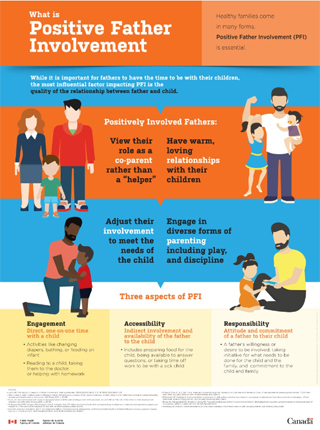What is positive father involvement
Download in PDF format
(114 KB, 1 page)
Organization: Public Health Agency of Canada
Healthy families come in many forms. Positive Father Involvement (PFI) is essential.
While it is important for fathers to have the time to be with their children, the most influential factor impacting PFI is the quality of the relationship between father and child.
Positively involved fathers:
- View their role as a co-parent rather than a "helper"
- Have warm, loving relationships with their children
- Adjust their involvement to meet the needs of the child
- Engage in diverse forms of parenting including play, and discipline
Three aspects of PFI
Engagement
Direct, one on one time with a child
- Activities like changing diapers, bathing, or feeding an infant
- Reading to a child, taking them to the doctor, or helping with homework
Accessibility
Indirect involvement and availability of the father to the child
- Includes preparing food for the child, being available to answer questions, or taking time off work to be with a sick child
Responsibility
Attitude and commitment of a father to their child
- A father's willingness or desire to be involved, taking initiative for what needs to be done for the child and the family, and commitment to the child and family
Sources
- Lamb ME. The history of research on father involvement. Marriage Fam Rev. 2000;29(2-3):23-42. DOI: 10.1300/J002v29n02_03
- Allen S, Daly K, Ball J. Fathers make a difference in their children's lives: a review of the research evidence. In: Ball J, Daly K, eds. Father involvement in Canada: Diversity, renewal and transformation. Vancouver: UBC Press; 2012. p. 50-88.
- Pleck, JH. Paternal involvement: revised conceptualization and theoretical linkages with child outcomes. In Lamb ME ed. The role of the father in child development. Hoboken, NJ: John Wiley & Sons; 2010. p. 58-93.
- Rodríguez Ruíz MM, Carrasco MA, Holgado-Tello C, Holgado-Tello FP. Father involvement and children's psychological adjustment: maternal and paternal acceptance asmediators. J Fam Stud. 2019 Apr;25(2):151-69. DOI: 10.1080/13229400.2016.1211549
- Elam KK, Sandler I, Wolchik S, Tein Y. Non-residential father-child involvement, interparental conflict and mental health of children following divorce: a person-focused approach. J Youth Adolesc. 2016 Mar;45(3):581-93. DOI: 10.1007/s10964-015-0399-5
- Zhang B, Zhao F, Ju C, Ma Y, et al. Paternal involvement as protective resource of adolescents' resilience: roles of male gender-role stereotype and sender. J Child Fam Stud. 2015 July;24(7):1955-65. DOI: 10.1007/s10826-014-9995-3
- D'Andrade AC, Sorkhabi N. Improving father involvement in child welfare practice and research: conceptual considerations from the social science literature. J Public Child Welf. 2016 Oct;10(5):542-60. DOI: 10.1080/15548732.2016.1176611
- Brown GL, Mangelsdorf SC, Shigeto A, Wong MS. Associations between father involvement and father-child attachment security: variations based on timing and type of involvement. 2018 Oct;32(8):1-10. DOI: 10.1037/fam0000472
- Holmberg JR, Olds DL. Father attendance in nurse home visitation. Infant Ment Health J. 2015 Jan;36(1):128-39. DOI: 10.1002/imhj.21490
